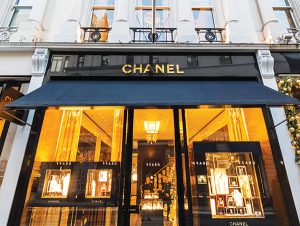Bloomberg
Chanel has raised global prices on some of its classic handbags by almost two-thirds since the end of 2019.
A spokeswoman said the hikes are in response to unspecified exchange-rate fluctuations, changes in production costs and to ensure its handbags cost roughly the same around the world. But luxury-sector executives and analysts say the magnitude of the increases signals an aggressive corporate strategy: asserting control over one of the brand’s most popular products while taking aim at higher-end rivals.
Since November 2019, the price of Chanel’s small classic flap bag in the US has gone up by 60% to $8,200, according to data compiled by Jefferies Group analyst Kathryn Parker. The large version of the handbag known as the 2.55 now costs $9,500 in the US following Chanel’s latest price hike, the brand’s fourth in two years. It cost $7,400, according to Parker.
Charles Gorra, chief executive officer of Rebag, which sells pre-owned luxury purses, says the push could be aimed at making Chanel’s products more exclusive, to gain ground on the most iconic handbags of all: the Birkin and Kelly bags by rival luxury house Hermes.
A medium-sized Chanel flag bag in France now costs 7,800 euros ($8,800), 100 euros less than a Birkin 30 in Togo calfskin by Hermes. Chanel is striving “to be part of the Hermes world and less of the Vuitton and Gucci world,†Gorra said. “They are trying to go upscale.â€
In addition to making its products more expensive, Chanel is cracking down on the number of handbags customers can purchase at one time, though the limits don’t appear to be consistent.
In Paris, a Chanel sales assistant told a Bloomberg News reporter that a customer is only allowed to buy one bag at a time, and must wait two months before buying another one, which can’t have the same features. In New York, there were monthly limits on the purchases of certain classic styles, while reporters in Hong Kong and Shanghai were told there were no restrictions.
Chanel could be hoping that this scarcity will make it “an even more desirable brand,†said Ines Ennaji, a business development manager at Paris-based Luxurynsight, which provides industry data. “By increasing desirability, they’ll have a reason to justify their price increases.â€
Chanel’s purchasing limits and price increases are “like telling consumers, if you can purchase a handbag, you belong to the club,†Gachoucha Kretz, associate marketing professor at business school HEC Paris, said. “Its iconic bags are best sellers.†But there are initial signs that Chanel’s changes are irking some shoppers, while enticing others to buy now to avoid future hikes.
The privately held Chanel, controlled by the billionaire Wertheimer brothers, reported an 18% decline in revenue and a 41% slump in operating profit in 2020, compared with a 6% revenue drop and 15% operating profit decline for Hermes.
Chanel appointed Leena Nair, a Unilever executive, as CEO starting in January.
 The Gulf Time Newspaper One of the finest business newspapers in the UAE brought to you by our professional writers and editors.
The Gulf Time Newspaper One of the finest business newspapers in the UAE brought to you by our professional writers and editors.
